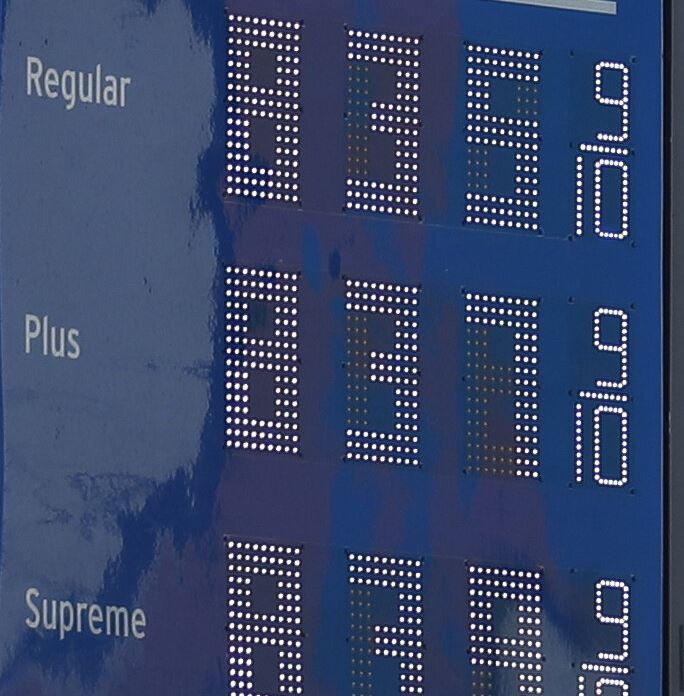In the United States, gasoline prices are on the rise, reversing a months-long downward trend and diminishing a key talking point for the Biden administration, which had been highlighting its effectiveness in alleviating pressure on drivers since the summer.
Analysts cite a loss of refining capacity in California and Ohio, as well as an increase in demand over the past few weeks, as two new factors pushing gasoline prices higher.
According to AAA statistics, the national average price of regular gasoline was $3.891 per gallon on Friday, an increase of more than two weeks. That’s less than the record of $5.02 set in June, but it’s still above average for this time of year.
California has experienced a particularly large price increase. At approximately $6.39 per gallon, prices are close to the state record of $6.44 set in June. After numerous refineries in the area stopped for maintenance, gas prices there and in other Western states, including Nevada and Arizona, spiked.
If the spike persists, it might put pressure on the White House to act swiftly to reduce costs. As consumer prices soared across the board, a jump in gas prices, which mirrored a surge in crude oil and other energy expenses following Russia’s invasion of Ukraine, became both a political liability and a policy challenge.
President Biden, who reacted to the rise in petrol prices throughout the summer by criticising energy firms for profiting off of people, released oil from strategic reserves and urged Saudi Arabia to produce more oil. Eventually, gas prices began to decrease as global oil prices plummeted in response to mounting concerns about the faltering global economy and as demand slowed.
As the run of reductions reached 98 days, the White House often highlighted the fall and the savings it would provide to motorists.
The current increase indicates that White House officials are under pressure to address the matter once again. Director of the National Economic Council Brian Deese said on Thursday that energy providers must reduce pump costs.
“The difference between wholesale and retail prices has decreased,” he stated during a press briefing. “It hasn’t fallen enough — correct? — but it has fallen.”
Analysts predict that the refinery shutdowns will be brief, and the fact that Americans drive less in the winter might prevent prices from spiking as much as they did in June. However, the recent rise in crude oil prices, which jumped about 17 percent this week after the world’s biggest oil producers agreed to reduce output, makes it impossible to forecast what will happen next.
“This is not the fault of the Biden administration, but they know that if gas prices return to $4.50 on Election Day, they’re in danger,” said Tom Kloza, founder of the Oil Price Information Service, a price reporting organisation, in reference to the midterm elections in November.
In addition to the political ramifications, a persistent increase in petrol costs might alter how companies and consumers see the economy. In July, dropping gas prices contributed significantly to the Consumer Price Index’s better-than-expected figure, delivering a short ray of optimism to those searching for indications that inflation had peaked.
Phillips 66’s Washington State refinery and Valero’s and Chevron’s facilities in San Francisco are among the West Coast refineries that have closed.
Every shutdown cannot be predicted. In September, the BP refinery in Toledo, Ohio, was closed due to a fire. Bloomberg News reported last month that it may not reopen until early 2023, citing anonymous sources. On Friday, the average price of gasoline in Ohio increased to $3.939 a gallon from $3.609 a month earlier.
Chevron and Phillips 66 said that they do not comment on their refineries’ daily activities. BP and Valero did not reply quickly to inquiries on the facilities. Analysts said that refineries often do not provide extensive information on closures or reopenings.
Since Gov. Gavin Newsom announced last week that the state could begin producing its winter blend of gasoline early, prices in California and other states have decreased slightly. The winter blend is cheaper for refiners to produce because it contains fewer additives that protect against summer environmental conditions. AAA spokesperson Devin Gladden said that the introduction of the winter mix, along with the possibility of reduced demand during the autumn and winter driving seasons, might help bring prices back down.
Mr. Newsom said through Twitter on Friday that he will convene a special session of the California Legislature to consider a “windfall profits tax” on energy corporations that are benefitting from high prices, a move that some Democratic politicians in Washington have also advocated. In May, Britain imposed a similar tax on “exceptional” oil company earnings.
On Wednesday, the group known as OPEC Plus, which includes Saudi Arabia and Russia, announced that it will reduce oil output by two million barrels per day. The Biden administration condemned this move immediately. Mr. Biden told reporters on Thursday that he was “disappointed” by the decision, and the White House announced that it would release more oil from the Strategic Petroleum Reserve, the nation’s crude oil reserve.
Mr. Gladden said that the overall effect of the statement remained a “huge maybe.” It might result in a short-term increase in prices, but its sustainability would depend on how energy investors respond to the reduction, he added. Several OPEC Plus members are already failing to reach output requirements, according to analysts.
Mr. Kloza said that he did not anticipate a “exceptional increase” in costs, especially one equivalent to what customers faced earlier in the year. Nonetheless, prices are vulnerable to several factors, many of which are unanticipated, such as hurricanes and wildfires that cause severe refinery shutdowns.
